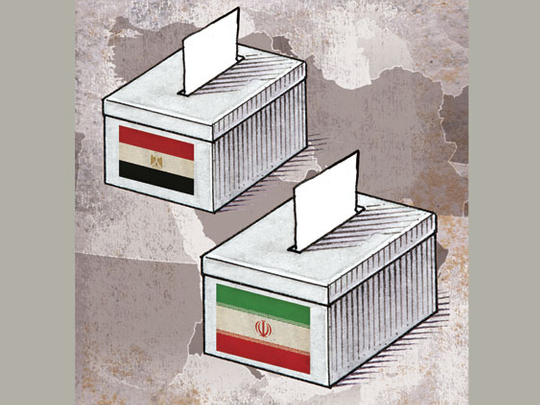
In about three months’ time, we will witness a drastic change in the Middle East, which can either plunge us and the whole region into chaos or land us on the shores of stability. The change will occur in Iran and Egypt. In both these countries, there will be a general election. In June, the Iranian general elections will be held and this time, Mahmoud Ahmadinejad, the current president, will not be able to run for another term by law as this is his second and last. In his past eight years as president, Iran has witnessed an escalation of tensions with the international community that has not been experienced since the early days of the Iranian Revolution.
Central to the escalation was Iran’s insistence to continue uranium enrichment, which provoked a very serious boycott by the West and elicited suspicion worldwide. It also led to heightened fear in the region, especially in neighbouring countries. The recent earthquake that shook Iran occurred not far from Bushehr nuclear facility and was soon followed by another earthquake a few days later, which was felt in Kuwait, Manama and many parts of the UAE, raising the alarm that is frequently discussed behind closed doors in the Gulf capitals. What if a larger and more severe earthquake hit an area much closer to the Bushehr facilities? Are we going to witness a second Chernobyl disaster? The immediate victims in such a case will not just be the Iranians but citizens in several Gulf countries.
The people in the region still reminisce the olden days of Akbar Hashemi Rafsanjani and Mohammad Khatami, who worked hard to bring peace and stability to Iran and its neighbours, and ask themselves if the next Iranian president will be someone like Khatami or Ahmadinejad. But it looks like the leadership in Tehran has not decided on the specific credentials required of the next presidential candidate.
To put a person like Ahmadinejad in charge — either coming from the hardline establishment or from the Revolutionary Guards — means business as usual for the next eight years, continuous conflicts and disarray in the region and beyond. Whereas, to put a more modest person coming from the middle of the road of the political establishment in Iran in charge means some much-needed reconciliation and harmonisation — both for the future of Iran and stability of the region and the world.
It looks like Tehran has not yet made up its mind on this issue, at least not publicly. To a large extent, it looks like Tehran is waiting to see how events in Syria unfold. The upcoming presidential elections in Iran will largely determine the future of the regional scenario. We have to seriously think of the reaction of Benjamin Netanyahu’s government in Israel, which repeatedly threatens to take action if Tehran does not abide by international norms.
In Egypt, another general election is to be held. It will be the first parliament under the newly written constitution, which is itself being questioned by a sizeable segment of Egyptian society. The elections, if the opposition decides to participate, can challenge the majority that Muslim Brotherhood enjoyed in the immediate aftermath of the Egyptian revolution. This in itself can bring about a major change in the region. The question here is, will the Muslim Brotherhood movement give in easily after having enjoyed power? If the Brotherhood loses power through the ballot boxes, the region as a whole will enter a real democratic era and the largest Arab nation can experience a peaceful change of power. And that will be reflected sooner or later in the entire Middle East. The battle in Egypt is still being fought, but the situation is similar to Tehran — marked by vagueness and opacity.
Although time is short, neither Cairo nor Tehran has any clear plan of action about the future in the medium or long terms. Since events in the Middle East keep surprising everybody, there is no inclination for medium-term planning.
During the last half century, political events in the Middle East have taught us to expect the unexpected — an oasis of stability that has suddenly become a centre of chaos. It happened time and time again as the tentative became permanent. When the military officers took over power in Egypt and later in other Arab countries, they declared that they were coming in to take charge for a short time and would leave after establishing real democracy. Yet, some of them have stayed on for 40 and even 60 years!
Mohammed Alrumaihi is a professor of political sociology at Kuwait University.








